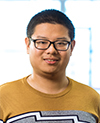
BMS Phase II Student since 2021
When I was an undergraduate student in China, I decided to do research in mathematics. At that time, a poster from the BMS was on the bulletin board of the department building. After reading it and finding more information on the BMS website, I decided to apply for this program. Fortunately, after two rounds of interviewing, I got admitted to BMS Phase I.
Studying abroad is not easy because there are many things to deal with, including visa procedures, housing, health insurance, enrollment at the university and so on, but the BMS liaison officers helped a lot. They sent me a handbook about what is needed to study and live in Berlin. I was also given a list with the materials that I should prepare before coming to Berlin and all the administrative procedures that I should deal with chronologically.
After the studies start, the BMS liaison officers also give much help, for example in explaining the study regulations at the three universities, registration for courses and exams and reminding of closing of shops during holidays. Especially the past two years have been very special due to the outbreak of Covid-19, during which the BMS liaison officers have given us health advice and reminded us of the newest anti-virus policies regularly.
Berlin is also a friendly city to a foreigner like me who cannot speak a single German word. When I stepped on this land for the first time, I was confused and lost, but everyone, from bus drivers to passers-by on the street, was glad to help.
Thanks to the good mathematical education provided by my undergraduate school, I didn’t experience too much difficulty during my Phase I studies. But there is still something different. I think that probably the most challenging thing for a typical Chinese student like me is having oral exams in Berlin. In the Chinese education system, students are often required to remember as much knowledge as possible, to be as skilled as possible in the techniques of solving problems and to solve as more difficult problems as possible. However, a general oral exam in Berlin requires students to have a global view on the knowledge system, which more concretely means to know how the knowledge system is organized and how to understand the knowledge but not only to give the right answer, while techniques in complicated calculation are usually not emphasized.
The BMS provides great assistance on the academic development of students in many aspects. One of these is the well-organized official website, from which almost all helpful information related to the study and the research can be found, for example, the category of all mathematical courses given at all three universities in Berlin as well as at Universität Potsdam in every semester that account for the graduation, classified by levels and research areas, with lecturers, schedules and locations are explicitly shown, which saves the time from gathering information from the websites of those universities respectively by ourselves.
Participating in courses and taking exams is not what Phase I is all about. There are also many different types of academic activities. For example, there are MATH+ Fridays every other Friday, in which great mathematicians from all over the world in different areas are invited to talk about the most recent progress. There is the student compact course as part of the Thematic Einstein Semester in early October every year, which is a series of lectures given by some experts in a certain area that differs from year to year. There are opportunities for Phase I students to attend international academic activities. For example, in the summer of 2019, I went to the MSRI summer school held at the University of Notre Dame in the US, during which I met some famous people in algebraic geometry, like Robin Hartshorne and David Eisenbud.
Daily life as a university student in Berlin is much different from that in China. In China the campus is bounded in a certain area and provides almost all functions in daily life, so that students can survive even never stepping out of the campus. But this is not the case in Berlin, where the university institutes are distributed in the city, in which case students don’t live on campus, but live in the city, so that they can know more about the culture of the city and the lifestyle of local people. As a student who lives in the southwest suburb but has most courses in the southeast suburb, it is normal for me to travel by bus and train starting from the green trees and winding rivers in the southwest, via the palaces, halls, markets and shopping malls in the downtown and finally arriving in the industrial and technological park in the southeast, which is an interesting experience and makes me more familiar with this city, although it sometimes makes me exhausted.
The BMS student representatives organize rich after-class activities, like ice-skating, beer party, visiting the Christmas market in Dresden and so on. These activities have helped me to experience local culture, make many friends and relax from the academic load.
Now I have entered Phase II. Doing research is like climbing a mountain that has never been conquered, which is not easy, but I am confident that I can make more and more progress because I am beneficial from rich resources and a good community given by the BMS.
Li Li
PhD Student at HU Berlin since 2021 (funded through BMS Phase II Scholarship)
MSc at HU Berlin 2020 (BMS Phase I Student (2018-20))
BSc at Tsinghua University 2018
Published in May 2021





















